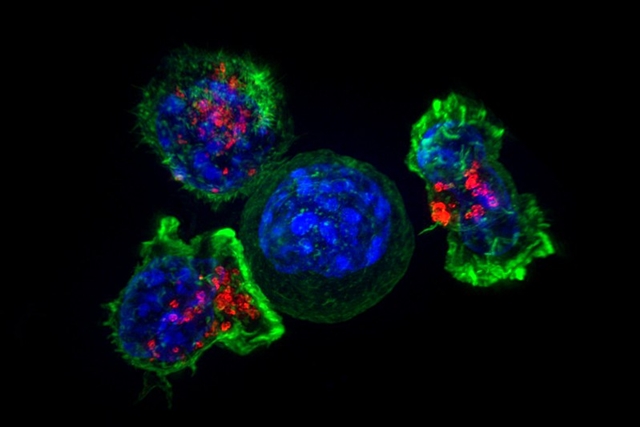26 Apr. 2022. A California state agency is helping fund a clinical trial testing an immunotherapy combined with a cancer-killing virus to treat solid tumor cancers. The California Institute for Regenerative Medicine or CIRM awarded $8 million to BioEclipse Therapeutics in Mountain View, California for the company’s study of its experimental cancer therapy.
BioEclipse Therapeutics is a five year-old biotechnology enterprise developing cancer immunotherapies, particularly for solid tumor cancers considered difficult to treat. The company’s technology, licensed from research at Stanford University, adapts cytokine-induced killer or CIK cells, derived from T-cells and natural killer cells in the immune system, altered further by adding cytokine enzymes. BioEclipse combines CIK cells with oncolytic viruses that infect and break down cancer cells, but not healthy cells. The company says its CIK cells work within 48 to 72 hours, by seeking out and binding to tumor cells, then releasing cancer-killing oncolytic virus payloads.
BioEclipse says its technology produces a high ratio of therapeutic to cancer cells, making it effective against large tumors and metastatic tumors spreading to other parts of the body. And, says the company, its treatments create a long-lasting immune response helping prevent new tumor growth. In addition, BioEclipse says its treatments can be made from a patient’s own CIK cells or from donor cells, which are not rejected by patients’ immune systems.
“We believe the best way to cure cancer,” says BioEclipse Therapeutics CEO Pamela Reilly Contag in a company statement released through Cision, “is by developing new, multi-mechanistic therapies that are safe, effective, and accessible to diverse populations. Our technology harnesses two distinct methods of action using immune cells loaded with a cancer-killing virus that targets cancer tissue but spares healthy tissue.”
Six types of advanced solid tumor cancer
CRX100 is BioEclipse Therapeutics’ first product, delivered through intravenous infusion, now assessed in an early-stage clinical trial. The study is recruiting 24 adults at two sites with advanced cases of six solid tumor cancers: triple negative breast cancer, a form of bone cancer called osteosarcoma, epithelial ovarian cancer, and colorectal, liver, and gastric cancer. Patients in the trial either have relapsing cancer, or have not responded to earlier treatments.
Oliver Dorigo, director of gynecologic cancer services at Stanford University and the clinical trial’s principal investigator notes that CRX100 “migrates to the tumor site, targets tumor cells, and delivers the cancer-destroying virus,” adding that the treatment “has the potential to significantly help those with chemotherapy-resistant or refractory solid tumors, including colorectal cancer, triple-negative breast cancer, ovarian cancer, gastric cancer, hepatocellular carcinoma, and osteosarcoma.”
The trial is testing CRX100 mainly for safety in patients with advanced cancers, with the study team looking for adverse reactions or toxicities from escalating doses of the treatments in the 28 days following infusion. Researchers are also tracking distribution of CRX100 in the body, as well as patients’ immune responses, and anti-tumor activity also within 28 days. Science & Enterprise reported on the start of the trial in March 2021.
CIRM announced last week its $8 million funding of the CRX100 trial, the 78th clinical study it has funded, as part of the agency’s latest round of support for translational research. CIRM was created in 2004 by a California referendum to fund research on stem cell therapies at a time when nationwide funding for stem cell research was in doubt. Another referendum in 2020 continues CIRM’s work that includes regenerative treatments from stem cells as well as advances in engineered cellular therapies.
More from Science & Enterprise:
- Early Trials Show Responses for Some Blood Cancers
- Trial Begins Testing Crispr Gut Microbiome Therapy
- Natural Killer Cells Stop Ovarian Cancer in Preclinical Test
- Biotech, Synthetic Bio Companies Partner on T-Cell Therapies
- Trial to Test AI-Designed Cancer Antibody Therapy
We designed Science & Enterprise for busy readers including investors, researchers, entrepreneurs, and students. Except for a narrow cookies and privacy strip for first-time visitors, we have no pop-ups blocking the page, nor distracting animated GIF graphics. If you want to subscribe for daily email alerts, you can do that here, or find the link in the upper left-hand corner of the desktop page. The site is free, with no paywall. But, of course, donations are gratefully accepted.
* * *


 RSS - Posts
RSS - Posts
You must be logged in to post a comment.